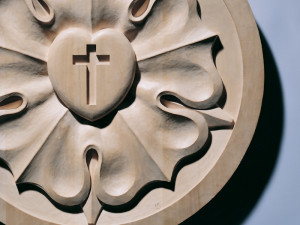by Rev. Mark Bestul
 If you were asked what the heart of the Christian faith is – what the heart of the Reformation was – what would you say? “Jesus Christ, crucified and risen for sinners”? Sounds about right. So, what if you were asked what is the heart of the Small Catechism, the basic textbook of the Reformation and the Christian faith? Would you say, “Second article of the Apostles’ Creed.” Absolutely!
If you were asked what the heart of the Christian faith is – what the heart of the Reformation was – what would you say? “Jesus Christ, crucified and risen for sinners”? Sounds about right. So, what if you were asked what is the heart of the Small Catechism, the basic textbook of the Reformation and the Christian faith? Would you say, “Second article of the Apostles’ Creed.” Absolutely!
What joy, comfort, and certainty belong to the Christian every time he confesses his salvation in the completed sacrifice of Jesus Christ: “[He] suffered under Pontius Pilate, was crucified, died and was buried. He descended into hell. The third day He rose again from the dead. He ascended into heaven…” That is true! And it’s true for you! Christ achieved it all for you! There is the heart of the Christian faith and of the Reformation. “It is finished! Christ achieved it all for you! For me!”
As Luther explains, this redemption is “for me”!: “I believe that Jesus Christ… has redeemed me, a lost and condemned person, purchased and won me from all sins, from death, and from the power of the devil…” What joy is mine! What joy is yours!
But, if the heart of the “for you” Christian faith is this second article, let us not forget to confess it all! Remember, the second article confesses not just the crucifixion, death, resurrection, and ascension of Christ; it first confesses his incarnation–not as if the first of many neatly chronological bullet points–but as the catalyst and beginning of the fulfillment of your promised Messiah. The death of Christ does not happen if he does not first become man. There is no resurrection of Christ if there is no body to rise in victory over death. The ascension is meaningless if it is simply about a spirit leaving behind the frailties of the flesh. The incarnation of Christ is indispensable to the Christian’s confession of the second article specifically because the incarnation is indispensable to the person and work of our God: Immanuel, “God with us” in the flesh; Jesus, “who will save His people from their sins.”
Thus, “[I believe] in Jesus Christ, His only Son, our Lord, who was conceived by the Holy Spirit, born of the Virgin Mary.” Or, as Luther explains, “I believe that Jesus Christ (then he confesses who this Jesus is: ), true God, begotten of the Father from eternity, and also true man, born of the Virgin Mary, is my Lord.”
The Small Catechism’s explanation magnifies the incarnation much as the second article does (much as the Advent/Christmas songs of Mary, Zechariah, and Simeon did!) specifically because “the incarnate God” equals “the redeeming God.” God did not take on flesh simply so that He could be seen in an earthly ministry. In fact, how much does the Creed or Luther’s explanation confess Jesus’ earthly ministry? Not at all! Not because his earthly ministry wasn’t important, but because the incarnation ought forever in our minds be tied to Christ crucified and our redemption.
This Advent and Christmas season, rejoice in the second article of the Creed – the heart of the Reformation… that Christ “was conceived of the Holy Spirit, born of the virgin Mary” specifically so that in one continuous breath we sinners might also confess the rest of the article and its meaning, that Jesus “has redeemed me, a lost and condemned person, purchased and won me… not with gold or silver, but with His holy precious blood and with His innocent suffering and death.” What joy is mine! What joy is yours!
The Rev. Mark Bestul is pastor of Calvary Lutheran Church in Elgin, IL
.
